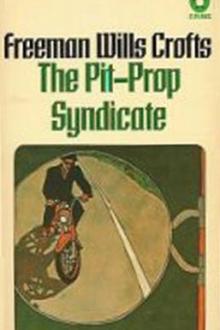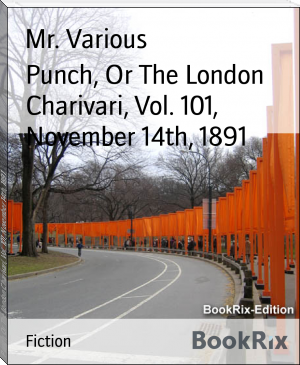The Pit Prop Syndicate, Freeman Wills Crofts [romantic love story reading .txt] 📗

- Author: Freeman Wills Crofts
- Performer: -
Book online «The Pit Prop Syndicate, Freeman Wills Crofts [romantic love story reading .txt] 📗». Author Freeman Wills Crofts
But when he had gone so far, he thought he might as well make certain that the brandy was discharged as he imagined. He calculated that the Girondin would reach Ferriby on the following day, and he determined to see the operation carried out.
He followed the plan of Hilliard and Merriman to the extent of hiring a boat in Hull and sculling gently down towards the wharf as dusk fell. He had kept a watch on the river all day without seeing the motor ship go up, but now she passed him a couple of miles above the city. He turned inshore when he saw her coming, lest Captain Beamish's binoculars might reveal to him a familiar countenance.
He pulled easily, timing himself to arrive at the wharf as soon as possible after dark. The evening was dry, but the south-easterly wind still blew cold and raw, though not nearly so strongly as on the night of his walk.
There were a couple of lights on the Girondin, and he steered by these till the dark mass of her counter, looming up out of the night, cut them off. Slipping round her stern, as Hilliard had done in the River Lesque, he unshipped his oars and guided the boat by his hands into the V-shaped space between the two rows of piles fronting the wharf. As he floated gently forward he felt between the horizontal props which held back the filling until he came to a vacant space, then knowing he was opposite the cellar, he slid the boat back a few feet, tied her up, and settled down to wait.
Though sheltered from the wind by the hull, it was cold and damp under the wharf. The waves were lapping among the timbers, and the boat moved uneasily at the end of her short painter. The darkness was absolute—an inky blackness unrelieved by any point of light. Willis realized that waiting would soon become irksome.
But it was not so very long before the work began. He had been there, he estimated, a couple of hours when he saw, not ten feet away, a dim circle of light suddenly appear on the Girondin's side. Someone had turned on a faint light in a cabin whose open porthole was immediately opposite the cellar. Presently Willis, watching breathlessly, saw what he believed was the steel pipe impinge on and enter the illuminated ring. It remained projecting into the porthole for some forty minutes, was as silently withdrawn, the porthole was closed, a curtain drawn across it, and the light turned up within. The brandy had been discharged.
The thing had been done inaudibly, and invisibly to anyone on either wharf or ship. Marvelling once more at the excellence and secrecy of the plan, Willis gently pushed his boat out from among the piles and rowed back down the river to Hull. There he tied the boat up, and returning to his hotel, was soon fast asleep.
In spite of his delight at the discovery, he could not but realize that much still remained to be done. Though he had learned how the syndicate was making its money, he had not obtained any evidence of the complicity of its members in the murder of Coburn.
Who, in addition to Archer, could be involved? There were, of course, Beamish, Bulla, Benson, and Henri. There was also a man, Morton, whose place in the scheme of things had not yet been ascertained. He, Willis realized, must be found and identified. But were these all? He doubted it. It seemed to him that the smuggling system required more helpers than these. He now understood how the brandy was got from the ship to the distillery, and he presumed it was loaded at the clearing in the same manner, being brought there in some unknown way by the motor lorries. But there were two parts of the plan of which nothing was yet known. Firstly, where was the brandy obtained from originally, and, secondly, how was it distributed from the distillery? It seemed to Willis that each of these operations would require additional accomplices. And if so, these persons might also have been implicated in Coburn's death.
He thought over the thing for three solid hours before coming to a decision. At the end of that time he determined to return to London and, if his chief approved, lay the whole facts before the Customs Departments of both England and France, asking them to investigate the matter in their respective countries. In the meantime he would concentrate on the question of complicity in the murder.
He left Hull by an afternoon train, and that night was in London.
CHAPTER 17. “ARCHER PLANTS STUFF”
Willis's chief at the Yard was not a little impressed by his subordinate's story. He congratulated the inspector on his discovery, commended him for his restraint in withholding action against Archer until he had identified his accomplices, and approved his proposals for the further conduct of the case. Fortified by this somewhat unexpected approbation, Willis betook himself forthwith to the headquarters of the Customs Department and asked to see Hilliard.
The two men were already acquainted. As has been stated, the inspector had early called at Hilliard's rooms and learned all that the other could tell him of the case. But for prudential reasons they had not met since.
Hilliard was tremendously excited by the inspector's news, and eagerly arranged the interview with his chief which Willis sought. The great man was not engaged, and in a few minutes the others were shown into his presence.
“We are here, sir,” Willis began, when the necessary introductions had been made, “to tell you jointly a very remarkable story. Mr. Hilliard would doubtless have told you his part long before this, had I not specially asked him not to. Now, sir, the time has come to put the facts before you. Perhaps as Mr. Hilliard's story comes before mine in point of time, he should begin.”
Hilliard thereupon began. He told of Merriman's story in the Rovers' Club, his own idea of smuggling based on the absence of return cargoes, his proposition to Merriman, their trip to France and what they learned at the clearing. Then he described their visit to Hull, their observations at the Ferriby wharf, the experiment carried out with the help of Leatham, and, finally, what Merriman had told him of his second visit to Bordeaux.
Willis next took up the tale and described the murder of Coburn, his inquiries thereinto and the identification of the assassin, and his subsequent discoveries at Ferriby, ending up by stating the problem which still confronted him, and expressing the hope that the chief in dealing with the smuggling conspiracy would co-operate with him in connection with the murder.
The latter had listened with an expression of amazement, which towards the end of the inspector's statement changed to one of the liveliest satisfaction. He gracefully congratulated both men on their achievements, and expressed his gratification at what had been discovered and his desire to co-operate to the full with the inspector in the settling up of the case.
The three men then turned to details. To Hilliard's bitter disappointment it was ruled that, owing to his being known to at least three members of the gang, he could take no part in the final scenes, and he had to be content with the honor of, as it were, a seat on the council of war. For nearly an hour they deliberated, at the end of which time it had been decided that Stopford Hunt, one of the Customs Department's most skillful investigators, should proceed to Hull and tackle the question of the distribution of the brandy. Willis was to go to Paris, interest the French authorities in the Bordeaux end of the affair, and then join Hunt in Hull.
Stopford Hunt was an insignificant-looking man of about forty. All his characteristics might be described as being of medium quality. He was five feet nine in height, his brown hair was neither fair nor dark, his dress suggested neither poverty nor opulence, and his features were of the type known as ordinary. In a word, he was not one whose appearance would provoke a second glance or who would be credited with taking an important part in anything that might be in progress.
But for his job these very peculiarities were among his chief assets. When he hung about in an aimless, loafing way, as he very often did, he was overlooked by those whose actions he was so discreetly watching, and where mere loafing would look suspicious, he had the inestimable gift of being able to waste time in an afraid and preoccupied manner.
That night Willis crossed to Paris, and next day he told his story to the polite chief of the French Excise. M. Max was almost as interested as his English confrere, and readily promised to have the French end of the affair investigated. That same evening the inspector left for London, going on in the morning to Hull.
He found Hunt a shrewd and capable man of the world, as well as a pleasant and INTERESTING companion.
They had engaged a private sitting-room at their hotel, and after dinner they retired thither to discuss their plan of campaign.
“I wish,” said Willis, when they had talked for some moments, “that you would tell me something about how this liquor distribution business is worked. It's outside my job, and I'm not clear on the details. If I understood I could perhaps help you better.”
Hunt nodded and drew slowly at his pipe.
“The principle of the thing,” he answered, “is simple enough, though in detail it becomes a bit complicated. The first thing we have to remember is that in this case we're dealing, not with distillers, but with rectifiers. Though in loose popular phraseology both businesses are classed under the term 'distilling,' in reality there is a considerable difference between them. Distillers actually produce the spirit in their buildings, rectifiers do not. Rectifiers import the spirit produced by distillers, and refine or prepare it for various specified purposes. The check required by the Excise authorities is therefore different in each case. With rectifiers it is only necessary to measure the stuff that goes into and comes out of the works. Making due allowance for variation during treatment, these two figures will balance if all is right.”
Willis nodded, and Hunt resumed.
“Now, the essence of all fraud is that more stuff goes out of the works than is shown on the returns. That is, of course, another way of saying that stuff is sold upon which duty has not been paid. In the case of a rectifying house, where there is no illicit still, more also comes in than is shown. In the present instance you yourself have shown how the extra brandy enters. Our job is to find out how it leaves.”
“That part of it is clear enough anyway,” Willis said with a smile. “But brandy smuggling is not new. There must surely be recognized ways of evading the law?”
“Quite. There are. But to follow them you must understand how the output is measured. For every consignment of stuff that leaves the works a permit or certificate is issued and handed to the carrier who removes it. This is a kind of way-bill, and of course a block is kept for the inspection of the surveying officer. It contains a note of the quantity of stuff, date and hour of starting, consignee's name and other information, and it is the authority for the carrier





Comments (0)